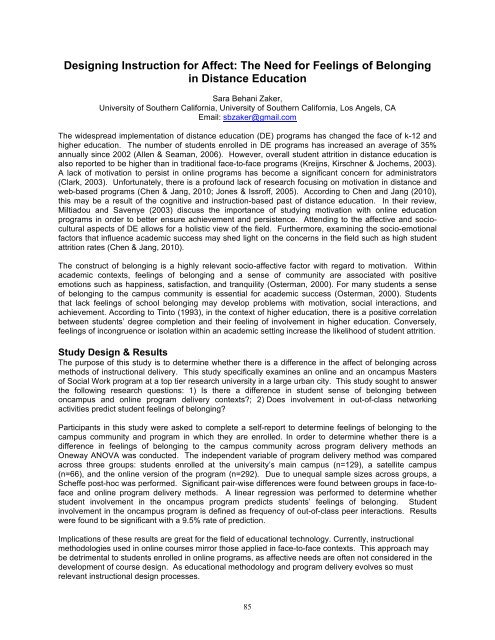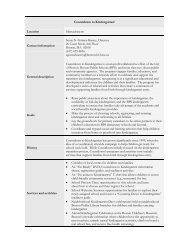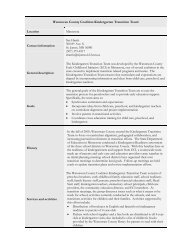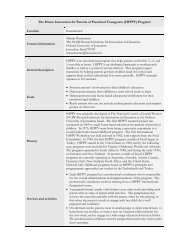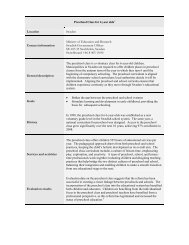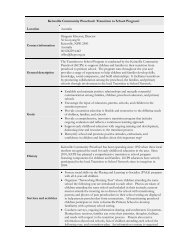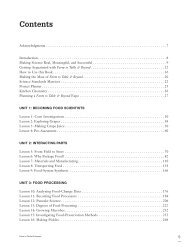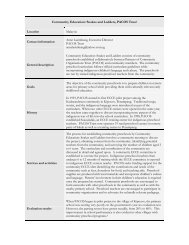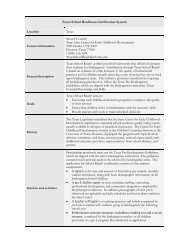Proceedings of the Fourth Annual Teachers College Educational ...
Proceedings of the Fourth Annual Teachers College Educational ...
Proceedings of the Fourth Annual Teachers College Educational ...
You also want an ePaper? Increase the reach of your titles
YUMPU automatically turns print PDFs into web optimized ePapers that Google loves.
Designing Instruction for Affect: The Need for Feelings <strong>of</strong> Belonging<br />
in Distance Education<br />
Sara Behani Zaker,<br />
University <strong>of</strong> Sou<strong>the</strong>rn California, University <strong>of</strong> Sou<strong>the</strong>rn California, Los Angels, CA<br />
Email: sbzaker@gmail.com<br />
The widespread implementation <strong>of</strong> distance education (DE) programs has changed <strong>the</strong> face <strong>of</strong> k-12 and<br />
higher education. The number <strong>of</strong> students enrolled in DE programs has increased an average <strong>of</strong> 35%<br />
annually since 2002 (Allen & Seaman, 2006). However, overall student attrition in distance education is<br />
also reported to be higher than in traditional face-to-face programs (Kreijns, Kirschner & Jochems, 2003).<br />
A lack <strong>of</strong> motivation to persist in online programs has become a significant concern for administrators<br />
(Clark, 2003). Unfortunately, <strong>the</strong>re is a pr<strong>of</strong>ound lack <strong>of</strong> research focusing on motivation in distance and<br />
web-based programs (Chen & Jang, 2010; Jones & Issr<strong>of</strong>f, 2005). According to Chen and Jang (2010),<br />
this may be a result <strong>of</strong> <strong>the</strong> cognitive and instruction-based past <strong>of</strong> distance education. In <strong>the</strong>ir review,<br />
Miltiadou and Savenye (2003) discuss <strong>the</strong> importance <strong>of</strong> studying motivation with online education<br />
programs in order to better ensure achievement and persistence. Attending to <strong>the</strong> affective and sociocultural<br />
aspects <strong>of</strong> DE allows for a holistic view <strong>of</strong> <strong>the</strong> field. Fur<strong>the</strong>rmore, examining <strong>the</strong> socio-emotional<br />
factors that influence academic success may shed light on <strong>the</strong> concerns in <strong>the</strong> field such as high student<br />
attrition rates (Chen & Jang, 2010).<br />
The construct <strong>of</strong> belonging is a highly relevant socio-affective factor with regard to motivation. Within<br />
academic contexts, feelings <strong>of</strong> belonging and a sense <strong>of</strong> community are associated with positive<br />
emotions such as happiness, satisfaction, and tranquility (Osterman, 2000). For many students a sense<br />
<strong>of</strong> belonging to <strong>the</strong> campus community is essential for academic success (Osterman, 2000). Students<br />
that lack feelings <strong>of</strong> school belonging may develop problems with motivation, social interactions, and<br />
achievement. According to Tinto (1993), in <strong>the</strong> context <strong>of</strong> higher education, <strong>the</strong>re is a positive correlation<br />
between students’ degree completion and <strong>the</strong>ir feeling <strong>of</strong> involvement in higher education. Conversely,<br />
feelings <strong>of</strong> incongruence or isolation within an academic setting increase <strong>the</strong> likelihood <strong>of</strong> student attrition.<br />
Study Design & Results<br />
The purpose <strong>of</strong> this study is to determine whe<strong>the</strong>r <strong>the</strong>re is a difference in <strong>the</strong> affect <strong>of</strong> belonging across<br />
methods <strong>of</strong> instructional delivery. This study specifically examines an online and an oncampus Masters<br />
<strong>of</strong> Social Work program at a top tier research university in a large urban city. This study sought to answer<br />
<strong>the</strong> following research questions: 1) Is <strong>the</strong>re a difference in student sense <strong>of</strong> belonging between<br />
oncampus and online program delivery contexts?; 2) Does involvement in out-<strong>of</strong>-class networking<br />
activities predict student feelings <strong>of</strong> belonging?<br />
Participants in this study were asked to complete a self-report to determine feelings <strong>of</strong> belonging to <strong>the</strong><br />
campus community and program in which <strong>the</strong>y are enrolled. In order to determine whe<strong>the</strong>r <strong>the</strong>re is a<br />
difference in feelings <strong>of</strong> belonging to <strong>the</strong> campus community across program delivery methods an<br />
Oneway ANOVA was conducted. The independent variable <strong>of</strong> program delivery method was compared<br />
across three groups: students enrolled at <strong>the</strong> university’s main campus (n=129), a satellite campus<br />
(n=66), and <strong>the</strong> online version <strong>of</strong> <strong>the</strong> program (n=292). Due to unequal sample sizes across groups, a<br />
Scheffe post-hoc was performed. Significant pair-wise differences were found between groups in face-t<strong>of</strong>ace<br />
and online program delivery methods. A linear regression was performed to determine whe<strong>the</strong>r<br />
student involvement in <strong>the</strong> oncampus program predicts students’ feelings <strong>of</strong> belonging. Student<br />
involvement in <strong>the</strong> oncampus program is defined as frequency <strong>of</strong> out-<strong>of</strong>-class peer interactions. Results<br />
were found to be significant with a 9.5% rate <strong>of</strong> prediction.<br />
Implications <strong>of</strong> <strong>the</strong>se results are great for <strong>the</strong> field <strong>of</strong> educational technology. Currently, instructional<br />
methodologies used in online courses mirror those applied in face-to-face contexts. This approach may<br />
be detrimental to students enrolled in online programs, as affective needs are <strong>of</strong>ten not considered in <strong>the</strong><br />
development <strong>of</strong> course design. As educational methodology and program delivery evolves so must<br />
relevant instructional design processes.<br />
85


